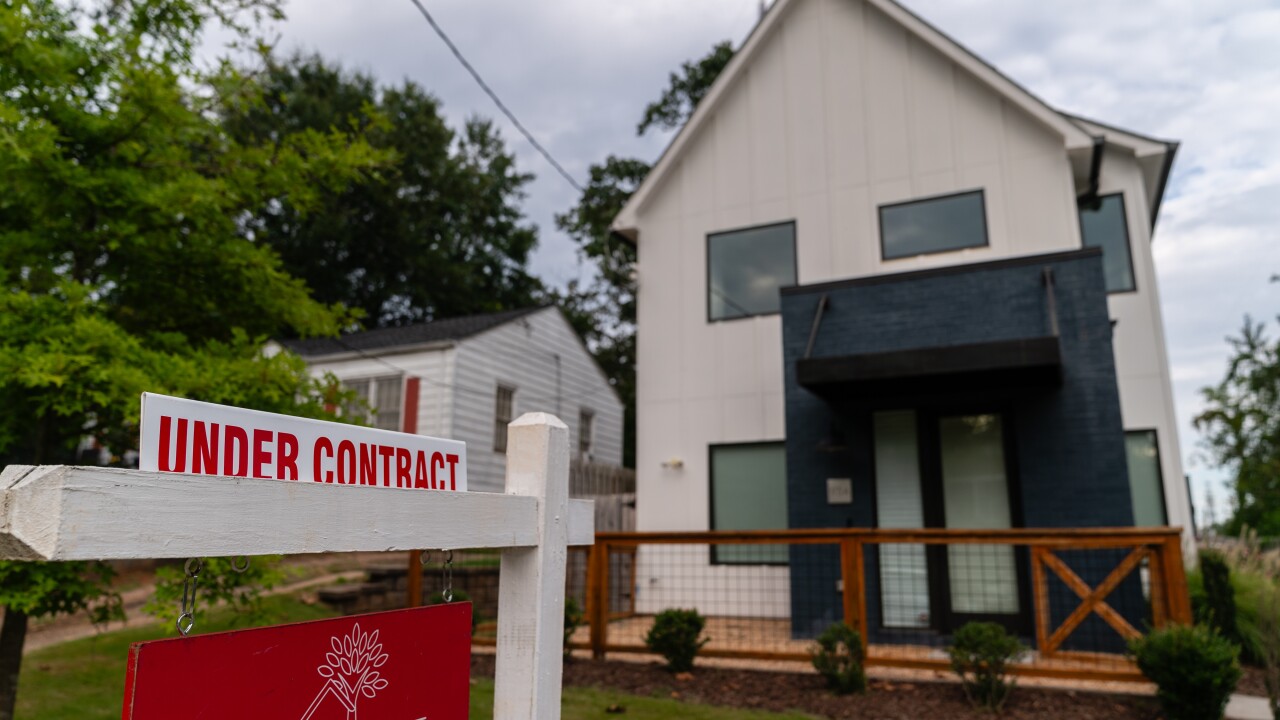WASHINGTON — Federal Reserve Gov. Jerome Powell, who heads the agency's supervisory committee, called on lawmakers Thursday to move more quickly in crafting legislation to reform the government-sponsored enterprises, saying that "we're almost at a now-or-never moment here."
Speaking at the American Enterprise Institute, Powell offered a handful of principles as guideposts for resolving what he described as the biggest unfinished business of the crisis. While he stopped short of endorsing any single plan, Powell appeared to support legislative talks around a bipartisan overhaul rather than a plan — supported by
“I do see bipartisan discussion going on, I hear people from all sides saying they find the current status quo unacceptable and seeing constructive movements,” Powell said. “If we don’t get on with this, we will find ourselves, I believe, with time, with a lot of exposure to the taxpayer and financial stability issues.”
With the conservatorships now almost a decade old, Powell said the risk of Congress and regulators falling back into a sense of complacency with regard to the housing market is high.
“It’s been nine years since the crisis, almost; it’s been almost nine years since Fannie and Freddie went into conservatorship, [we’re in] healthy economic times … if not now, when?” he said.
Mortgage industry insiders praised Powell's comments, saying they add to the momentum needed for Congress to act.
“The more we get people in leadership roles emphasizing the need for reform, articulating consistent principles and calling for bipartisan agreement, it encourages the Senate Banking Committee and leadership to move forward,” said David Stevens, president and CEO of the Mortgage Bankers Association and former commissioner of the Federal Housing Administration.

Laying out principles for a GSE reform plan, Powell said the mortgage giants should not be "too big to fail," and called for steps to ensure that they could be resolved safely. This can be done in a number of ways, he said, including by encouraging private capital to absorb losses, but he added that there should also be an explicit — rather than implicit — government guarantee of the securities that GSEs bundle.
“If Congress chooses to go in this direction, any such guarantee should be explicit and transparent, and should apply to securities, not to institutions,” Powell said. “Reform should not leave us with any institutions that are so important as to be candidates for too big to fail.”
Powell said any reform effort should also open up the market to mortgage securitization, in which a greater number of players can participate. He called the current system a “duopoly” that is insulated from market competition and encourages concentration of risk into Fannie and Freddie.
“Greater competition would help to reduce the systemic importance of the GSEs, and spur more innovation,” Powell said. “Greater competition also requires a level playing field, allowing secondary market access to a wide range of lenders and thereby giving homebuyers a choice among many potential mortgage lenders and products.”
Powell concluded that any solution should be simple and straightforward and bipartisan in nature. When asked to handicap the chances of such a reform package making its way through Congress, however, Powell demurred, saying, “I don’t consider myself an expert on what will happen in Congress."
Trump administration officials and congressional leaders have appeared to want to prioritize GSE reform. Now-Treasury Secretary Steven Mnuchin said during his
Powell was named head of the Fed's supervisory committee in April following the resignation of Fed Gov. Daniel Tarullo, who was widely viewed as the architect of the Fed's post-crisis regulatory approach. President Trump has three open seats to nominate to the Fed board, including the vice chair of supervision — who would also serve as head of the board's Supervisory Committee — but no nominations have yet been sent to the Senate.
Powell’s principles for reform generally fall squarely with steps senators are considering for dramatically reforming the housing finance system. He did not appear to embrace alternative approaches such as the "recap and release" idea or making more minor reforms that would allow the GSEs to operate largely like before.
Meanwhile, his call for opening up the GSE market falls in line with moves favored by the Mortgage Bankers Association. An MBA proposal envisions a handful of firms having securitization charters, including Fannie and Freddie. The MBA plan would have those firms operate as stand-alone companies similar to utilities. Potential guarantors could be pension funds, mortgage insurance companies and private equity firms that do not operate mortgage lenders.
Large mortgage lenders would be restricted from becoming guarantors themselves but could own up to a 10% stake in a guarantor under the MBA's plan.
“Governor Powell makes a very good case as to why we need to move forward towards reform and not be complacent with this current status or the model of the past that led to conservatorship in the first place,” Stevens said.
Yet small-lender advocates pushing for a less dramatic overhaul noted that Powell also appeared open to a simpler tack when it comes to GSE reform. Indeed, Powell said in this speech that "completely redrawing the system may not be necessary and could complicate the search for a solution." He added that it is worth considering "simple approaches that restructure and repurpose parts of the existing architecture of our housing finance system."
Small lenders and community banks support minor reforms of Fannie and Freddie largely out of concern that restructuring the housing finance system would deliver pricing and market advantages to the biggest banks.
"Small lenders believe that a prohibition on unequal pricing and risk share structures is a must for any housing finance reform proposal," said Glen Corso, executive director of the Community Mortgage Lenders of America. "CMLA agrees with Governor Powell that any housing finance reform should be simple and utilize the current structure."
Others were skeptical that Powell’s remarks would move the needle in favor of reform, saying the partisanship on the issue and distance between stakeholders still makes sweeping reform unlikely.
“Governor Powell has added his voice to the chorus calling for legislative GSE reform, but we remain bearish as key stakeholders are singing off of very different sheet music once we shift from generalities to specifics,” said Isaac Boltansky, an analyst at Compass Point Research & Trading.
Powell also sidestepped a question on whether the GSEs should be regulated as "systemically important financial institutions," a designation that the Financial Stability Oversight Council may apply to nonbank financial institutions at its discretion but that it has not applied to the GSEs since they were placed in conservatorship.
SIFI designation would subject the firms to heightened prudential regulation — including mandatory capital buffers — but Powell said such a move would not solve the structural problems the GSEs pose.
“You also need structural reform,” Powell said. “It’s not a question of capital standards. You need legislation that would restructure those entities.”





